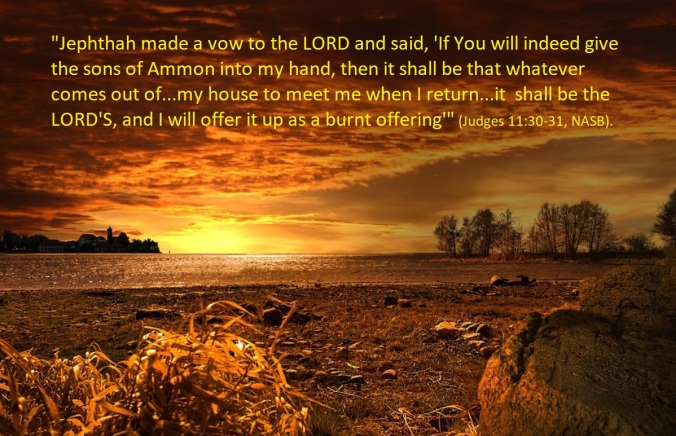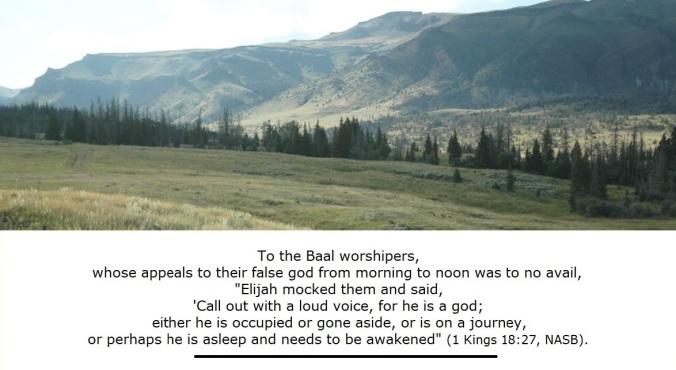“Go therefore and make disciples of all the nations…teaching them to observe all that I commanded you; and lo, I am with you always, even to the end of the age” (Matt. 28:19-20).
——————-
Contents:
1) Jephthah’s Daughter (Jeff Hamilton)
——————-

-1-
Jephthah’s Daughter
Jeff Hamilton
The story of Jephthah recorded in Judges 11:29-40 has caused difficulties for Bible students. Jephthah, by the Lord’s leading, is about to wage a major battle against the Ammonites. Before going off to battle, Jephthah makes a vow to God. The first thing that greets him from his home when he returns victorious from battle would be given as a burnt offering to God. The vow was not well thought out. Jephthah could not control who or what would first come from his door. In a sense he was letting chance determine what he would be offering. Some scholars point out that word translated “whatever” in Judges 11:31 is actually more properly translated “whoever.” [1] Hence, there is a strong indication that Jephthah was expecting to offer a person to the Lord as a burnt offering.
Herein lies the point of confusion. We know that God despises human sacrifices. The sacrifice of children to idols carried a death penalty (Leviticus 20:1-5). In Jeremiah 7:31-32 God not only said it wasn’t commanded, He said that He never thought about asking for it. “When the LORD your God cuts off from before you the nations which you go to dispossess, and you displace them and dwell in their land, take heed to yourself that you are not ensnared to follow them, after they are destroyed from before you, and that you do not inquire after their gods, saying, ‘How did these nations serve their gods? I also will do likewise.’ You shall not worship the LORD your God in that way; for every abomination to the LORD which He hates they have done to their gods; for they burn even their sons and daughters in the fire to their gods. Whatever I command you, be careful to observe it; you shall not add to it nor take away from it” (Deuteronomy 12: 29-32).
Why would God allow Jephthah to win a battle after vowing to offer up a human being to Him? Why is Jephthah listed among the heroes of faith in Hebrews 11:32? Even if we argued that Jephthah wasn’t expecting a person to come out of his door, wasn’t it possible for an animal unsuitable for sacrifices, such as a dog, to exit his home first? How could Jephthah know that an unblemished cow, goat, or lamb would be the first to greet him?
Old Testament Sacrifices
The Mosaical Law contained a variety of offerings (Leviticus 7:37). Sin offerings were given when a person unintentionally sinned (Leviticus 4). Guilt (or trespass) offerings were given when a person sinned unintentionally and had the possibility of making restitution for his sin (Leviticus 5:1-6:7). The purpose of the grain offering is never directly stated, but it appears to be used to express thankfulness to God (Leviticus 2; 6:14-23). It was offered at first harvest and in combination with other sacrifices, perhaps to show thankfulness for forgiven sins. Peace offerings were to show fellowship between the worshiper and God (Leviticus 3). When combined with other sacrifices, the peace offering was always done last as sin must be atoned before fellowship can exist with God. Burnt offerings are related to the sin and guilt offerings (Leviticus 1). It was offered for the atonement of sin (Leviticus 1:4), but the one making the offering could chose what was being offered. All the offerings involved burning portions, but the burnt offering was given wholly to God (Deuteronomy 33:10). Only the skin of the animals offered were kept (Leviticus 7:8). Dedication offerings were given when articles of the tabernacle or temple were put into service or when a person became a priest.
The burnt offering and grain offering were to be done on a daily basis for the nation. The sin offering, guilt offering, and dedication offerings were done as needed for the individual. The burnt offering, grain offering, and peace offering were offered by individuals at appointed occasions, such as feasts, as the fulfillment of a vow, or as a freewill offering (Numbers 16:3; 29:39).
When an individual offered a burnt offering, grain offering, or peace offering he was allowed to choose to offer whatever he desired within certain guidelines. For example, money and goods were given as freewill offerings (Ezra 1:4-6; 8:28); however, money gained from prostitution could not be accepted as fulfillment of a vowed offering (Deuteronomy 23:18). Even words of praise were considered to be freewill offerings (Psalms 119:108). Obviously, items that were not sacrificial animals were not burnt, in whole or in part. Instead, they were used in God’s service. II Chronicles 31:14 speaks of a man appointed to oversee the usage of freewill offerings.
Jesus’s death upon the cross is described as a combination of offerings. His death is called a sin offering (Hebrews 9:24-10:3; 13:10-14). If you recall that offerings which were burnt were said to be a sweet-smelling aroma to the Lord (Leviticus 1:17; 2:2; 3:16), you can see then that the Lord’s death was also a “burnt offering” even though he was not burnt (Ephesians 5:2). This is because Jesus gave himself wholly over to God to appease God’s wrath.
In the same way, Christians are expected to be a whole (or burnt) offering to God when we dedicate our lives in the service of God (Romans 12:1-2).
Special Rules for Vowed Sacrifices
Peace offerings, grain offerings, and burnt offerings could be vowed to God. When the vow was fulfilled, the offering had to be made (Deuteronomy 23:21-23; Ecclesiastes 5:1-4). Just about anything that belonged to a person could be vowed to God: people (Leviticus 27:2-8), livestock (Leviticus 27:9-13), homes (Leviticus 27:14-15), or property (Leviticus 27:16-25) are given as examples. Most vowed offerings could be redeemed, or bought back, and most of Leviticus 27 deals with how to determine the redemption price. However, certain things could not be redeemed: sacrificial animals (Leviticus 27:9-10), firstborn clean animals because they already belong to the Lord (Leviticus 27:26), or anything that a man sets apart for destruction, whether man, animal, or property (Leviticus 27:28). Anyone whom the Lord has set apart for destruction cannot be redeemed as they are under a death sentence (Leviticus 27:29). By implication, firstborn children also could not be redeemed if they are vowed because they already belong to God (Exodus 13:2, 12-15). In addition, anything vowed once and redeemed, could not be redeemed if it was vowed a second time.
Obviously, anything vowed as a burnt offering is vowed for destruction. It cannot be redeemed. If it is a sacrificial animal, it will be offered up to God. Everything else becomes most holy and belongs to God (Leviticus 27:28). For example, property that becomes vowed for destruction, whether on purpose or by selling it before it is redeemed, becomes the property of the priests (Leviticus 27:20-21). Other things would be put into service for God.
This is how Samuel, the firstborn son of a Levite (I Chronicles 6:16, 28), came to serve the Lord (I Samuel 3:1). His mother made a vow that if she was given a child, the child would be given to the Lord (I Samuel 1:11). Though Leviticus 27 allows for vowed children to be redeemed, a firstborn child already belongs to God and hence cannot be redeemed.
What Happened to Jephthah’s Daughter
When Jephthah returned from a victorious battle, the first person to greet him from his house was his only child. Because she was his first child, he would not be able to redeem her. Because he vowed her for destruction as a burnt offering, she not only could not be redeemed, but she was also marked as being most holy to the Lord (Leviticus 27:28). Both Jephthah and his daughter realized that Jephthah’s vow bound his daughter to be a virgin for the rest of her life. For Jephthah that meant the end of his lineage.
His daughter rightly encouraged her father to keep his vow. She just asked for two months to bewail her virginity (Judges 11:38). Notice that she did not grieve over her short life because her life wasn’t coming to an end. When Jephthah fulfilled his vow, it is noted that she never had sexual relations with a man (Judges 11: 39). There is no mention of her losing her life because of her father’s vow, nor is there any need to make such an assumption. Only sacrificial animals could be placed on the altar. Everything else was either redeemed or placed into service for God.
What would Jephthah’s daughter do in service to God? I’m sure there were many jobs the Levite women did which Jephthah’s daughter could have joined in doing. There are two verses mentioning women who served at the door of the tabernacle (Exodus 38:8; I Samuel 2:22). From John 18:16-17 and other ancient sources it appears that women were frequently employed as doorkeepers. Some believe that women vowed to God became the source of these workers. There is also mention of the widow Anna who stayed at the temple and served the Lord with fasting and prayers (Luke 2:36-37), like those mentioned in Psalm 134.
******
[1] New English Bible, Translator’s Notes: “the one coming out, who comes out from.” The text uses a masculine singular participle with prefixed article, followed by a relative pronoun and third masculine singular verb. The substantival masculine singular participle הַיּוֹצֵא; (hayyotse’, “the one coming out”) is used elsewhere of inanimate objects (such as a desert [Num 21:13] or a word [Num 32:24]) or persons (Jer 5:6; 21:9; 38:2). In each case context must determine the referent.
— Via Articles from the La Vista church of Christ
——————-
The Steps That Lead to Eternal Salvation
1) Hear the gospel, for that is how faith comes (Rom. 10:17; John 20:30-31).
2) Believe in the deity of Christ (John 8:24; John 3:18).
3) Repent of sins (Luke 13:5; Acts 17:30).
4) Confess faith in Christ (Rom. 10:9-10; Acts 8:36-38).
5) Be baptized in water for the remission of sins (Mark 16:16; Acts 2:38; 22:16; Rom. 6:3-4; Gal. 3:26-27; 1 Pet. 3:21).
6) Continue in the faith, living for the Lord; for, if not, salvation can be lost (Heb. 10:36-39; Rev. 2:10; 2 Pet. 2:20-22).
——————–
Tebeau Street
CHURCH OF CHRIST
1402 Tebeau Street, Waycross, GA 31501
Sunday services: 9:00 a.m. (Bible class); 10 a.m. & 5 p.m. (worship)
Wednesday: 7 p.m. (Bible class)
evangelist/editor: Tom Edwards (912) 281-9917
Tom@ThomasTEdwards.com
http://thomastedwards.com/go (Older version of Gospel Observer website without pictures, but back to March 1990)
http://tebeaustreetchurchofchrist.org/
http://ThomasTEdwards.com/audioser.html (audio sermons)



